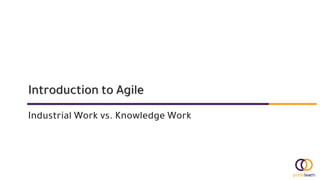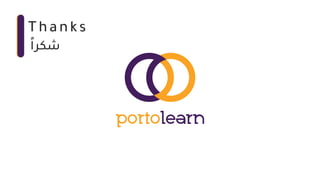What and why using agile
- 1. Introduction to Agile What and Why using Agile?
- 2. Why using Agile Why we need another approach for our projects?
- 3. Why using Agile? 1. Gives the teams an opportunity to learn with each new iteration. 2. Lets teams deliver a prototype and improve it with every cycle. 3. Manage shifting priorities more effectively. 4. Fast and flexible process increases productivity. 5. Supports regular and collaborative troubleshooting.
- 4. Why using Agile? 6. Anticipating incoming project changes. 7. Make quick-course corrections based on stakeholder feedback. 8. Stakeholders can provide feedback as the project evolves. 9. Empowering project teams to work creatively and effectively. 10.Higher Quality Product.
- 5. Introduction to Agile Industrial Work vs. Knowledge Work
- 6. “ Not all work is the same ” - Ahmed Sidky, Dr. Agile
- 7. Industrial Work (Definable Work) Knowledge Work (High-uncertainty Work) Industrial Work vs. Knowledge Work
- 8. Industrial Work Work is visible. Work is stable. Emphasis is on running things. More structure with fewer decisions. Define the task. Strict standards. Focus on quantity. Measure performance based on standards. Minimize cost of workers for a task. Knowledge Work Work is invisible. Work is changing. Emphasis is on changing things. Less structure with more decisions. Understand the task. Continuous innovation. Focus on quality. Continuously learn and teach. Treat workers as assets, not as costs.
- 9. Introduction to Agile Industrial Work vs. Knowledge Work
- 10. Another way of looking at the difference between knowledge work and industrial work is to examine the different kinds of processes they use.
- 11. Industrial work typically uses a defined process.
- 12. Knowledge work relies on an empirical process.
- 13. Industrial Work uses a defined process • Define the steps in advance. • A well-understood project in an unchanging environment. • Planned and managed by using a defined approach.
- 14. Knowledge Work relies on an empirical process • Processes are not well-defined When faced with a new process. • An experiment is required to determine what works. • Required for uncertain and risky projects.
- 15. What is Agile
- 16. What is Agile? https://www.atlassian.com/agile An iterative and incremental approach to project development that helps teams deliver value to their customers faster and with fewer headaches.
- 17. Thanks ً شكرا

















